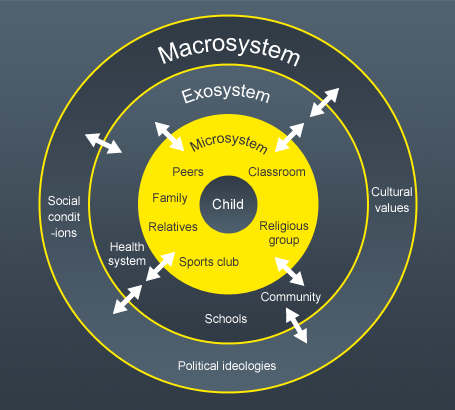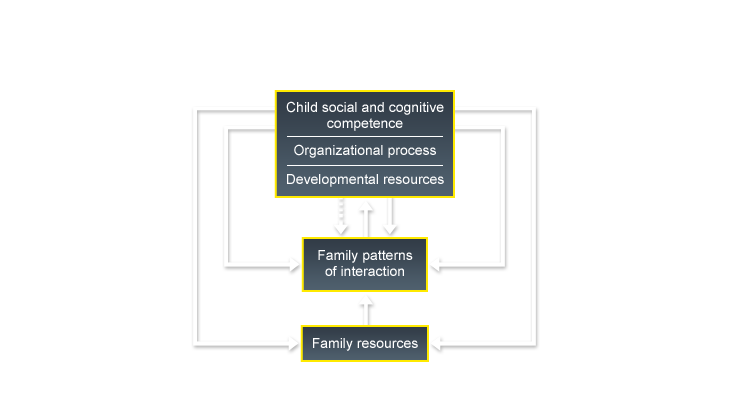
Frameworks, models and theories can help you identify the single and cumulative influences on a child's developmental progress and help to identify strengths and individual resilience that a child brings to identified problems or difficulties.
Open University et al, 2006
Frameworks:
- Facilitate the design, implementation and evaluation of programmes;
- Define the knowledge base on which decisions are made;
- Are the structures within which we understand children's development;
- Are the perspectives from which analysis, planning, intervention and review take place.
(Guralnick, 2011; Open University et al, 2006)


Together these systems are referred to as the social context of human development and as a whole they shape both what is regarded as successful socialization for a child as well as the proximal processes through which the child achieves or perhaps fails to achieve these socialization goals...
Siraj-Blatchford et al, 2011
Rogoff conceives of every level in Bronfenbrenner's model as interacting with all the other levels. She writes:

The separation into nested systems constrains the idea of the relations between individual and cultural processes...

...People of each generation, as they engage in sociocultural endeavour with other people, make use of and extend cultural tools and practices inherited from previous generations. As people develop through their use of shared cultural tools and practices, they simultaneously contribute to the transformation of cultural tools, practices and institutions.
Rogoff, 2003

Contemporary thinking about children's development allows for a diversity of inputs, transactions and outcomes... The Developing World of the Child resource materials have adopted a framework of development which acknowledges these different perspectives in what is called the developmental-ecological approach to child development. This framework gives scope for identifying and assessing the range of individual positive and negative influences that may have an impact on the way a particular child develops.
The Developing World of the Child, undated

The goal of the developmental systems approach is to understand the developmental mechanisms that are involved
in promoting a child's development in the context of early intervention for vulnerable children and
their families.
For this to be accomplished, an integration of the developmental science of normative development,
the developmental focus on risk and disability, and intervention science
is essential.
Guralnick, 2011
Together these systems are referred to as the social context of human development and as a whole they shape
both what is regarded as successful socialization
for a child as well as the proximal processes through which the child achieves or perhaps fails to achieve these
socialization goals...
Siraj-Blatchford et al, 2011


The International Classification of Functioning, Disability and Health (ICF) (World Health Organisation, 2007) is a classification of human functioning rather than of functional problems... It recognises that disability is a universal human experience and shifts the focus from cause to the impact it has on the lives of people in society.
McConnachie et al, 2006

Aldgate, J., Jones, D.P.H., Rose, W. and Jeffrey, C. (2006) The Developing World of the Child. London: Jessica Kingsley.
Bronfenbrenner, U. (1979) The Ecology of Human Development. Cambridge, MA: Harvard University Press.
Guralnick, M.J. (ed.). (2005) The Developmental Systems Approach to Early Intervention. Baltimore: Brookes.

McConachie, H., Colver, A.F., Forsyth, R.J., Jarvis, S.N. and Parkinson, K.N. (2006) Participation of disabled children: how should it be characterized and measured?, Disability and Rehabilitation, 28 (18), 1157-1164.
Rogoff, B. (2003). The Cultural Nature of Human Development. New York, NY: Oxford University Press.
Bronfenbrenner, U. (1979) The Ecology of Human Development: Experiments by Nature and Design. Cambridge, MA: Harvard University Press.
Bronfenbrenner, U. and Morris, P.A. (1998) The ecology of developmental processes. In W. Damon and R.M. Lerner (eds) Handbook of Child Psychology (Vol. 1): Theoretical models of human development (5th edn). New York, NY: John Wiley.

McConachie, H., Colver, A.F., Forsyth, R.J., Jarvis, S.N. and Parkinson, K.N. (2006) Participation of disabled children: how should it be characterized and measured?, Disability and Rehabilitation, 28 (18), 1157-1164.

Rogoff, B. (2003). The Cultural Nature of Human Development. New York, NY: Oxford University Press.
Siraj-Blatchford, I., Mayo, A., Melhuish, E., Taggart, B., Sammons, P. and Sylva, K. (2011) Performing against the odds: developmental trajectories of children in the EPPSE 3-16 study. London: Department for Education.